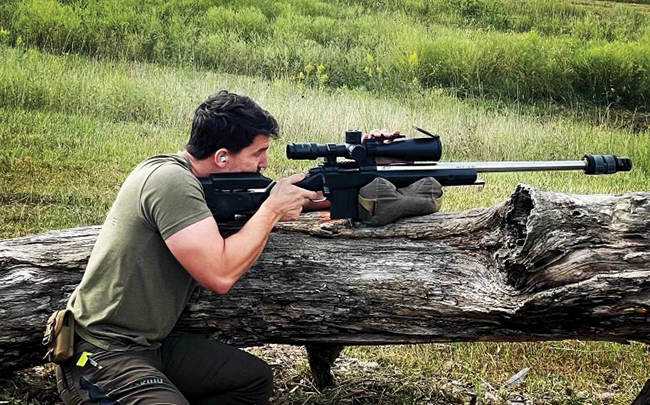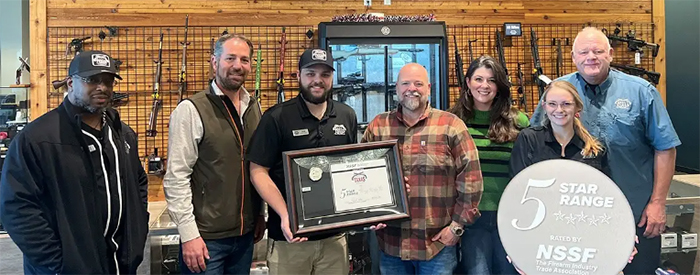Expertise Brings In-Store Edge
You and every one of your competitors have shelves full of guns, ammo and accessories. The challenge is convincing customers to spend their money with you.
Customer decisions are influenced by a range of factors. Some will shop with you because you’re the closest store. Some may like your prices. Maybe it’s your range that draws them in.
Finding an edge can be tough, and there’s no single way to do it. But consider the value you can offer customers by providing them with in-store expertise they can’t find anywhere else.
Walk into any gun store in the country and you’ll find a salesperson behind the counter who can talk about the various flavors of GLOCK, Ruger and Smith & Wesson. They can point out some of the differences between various hunting calibers and why one optic might be better than another.
But imagine you have someone (or multiple someones) on staff with true expertise in a particular area of shooting. These are the people who can offer your shop an edge over your competitors — particularly the big-box stores with their far-less-personal approach.
Let’s take a look at three situations where the value of this expertise can make a difference.
Long Range
oking to get into long-range shooting when he stepped into a big-box sporting goods store for advice. He still remembers the salesman warning him 6.5 Creedmoor would be a waste of his money.
This kind of bad advice is what he hopes to avoid now that he has his own shop, Full Circle Reloading and Firearms in St. Charles, Mo.
The problem was the salesman had no real concept of what “long range” meant. For some people, it might mean 200 yards, but for those shooting in precision rifle competitions, distances reach 1,000 yards and beyond.
Bennett strives to prevent similar situations from occurring in his store. Certainly, he’s in the business of selling guns and reloading supplies. But he also feels his shop has an educational mission.
“It’s important because we need to be a source of actual, real-world information,” Bennett shared.
To that end, he brings a half-decade’s worth of experience shooting long-range competitions across the country. When he walks a customer through equipment needs and choices, his experience allows him to speak with authority. His own well-used gear is on display in the shop.
Anyone who’s ever dipped a toe into a new realm of shooting knows there are many ways to waste money — buying guns and accessories that are quickly replaced by stuff better suited for the task. One of the values Bennet brings to his customers is helping them get it right the first time.
“Don’t get me wrong, I want their money,” Bennett said, “but I want it honestly. I don’t want them to buy something just for the sake of making a sale.”
To further engagement, the shop produces informational YouTube videos as part of its social media strategy. They teach classes on long-range shooting. Bennett also works as an ambassador for the store when he attends competitions — where he will often deliver products to customers.
These efforts help create relationships and loyalty among customers, particularly among those who have benefited from the information they get from the store.
“The amount of people who are coming back showing us their groups is probably the most positive thing we’ve seen so far,” he concluded.
Action Pistol
It was in the middle of March when a new customer walked into Centennial Gun Club asking to see Joey Mizufuka, a sales manager and instructor at the Centennial, Colo., shop.
The man, who had just left the military, was interested in getting involved in action pistol competitions. He decided to seek out Mizufuka after seeing his experience with USPSA mentioned on the company website.
Mizufuka spent about 45 minutes with the guy, walking him through some of the basics. By the time the encounter was over, the new customer had signed up for a class, bought a gun and paid for a membership.
It’s not a daily occurrence, but there are times when other staffers will send a customer his way for the knowledge he has about various handgun disciplines.
“Whether it’s IDPA, USPSA, steel challenge or whatnot, not all guns are created equal,” he informed. “And not all guns are legal in certain divisions in those disciplines. So, it’s paramount to have someone on staff who has a good feel for all of it.”
He also reaches customers through a monthly class: intro to competitive shooting. The class is mandatory in Colorado for anyone wanting to compete in practical shooting sports. The store also hosts a monthly USPSA match, with Mizufuka serving as the club president.
It all puts him in a visible position for customers interested in handgun games. And it often results in sales of holsters, magazines, mag pouches, belts and guns.
“I know how valuable it can be, especially for newer shooters who are just trying to soak everything up like little sponges, trying to learn what they can,” he said.
Hunting
Jason Gentz started hunting around the age of 12 and hasn’t stopped. Living in Minnesota, he started with white-tailed deer, ducks and grouse. Ten years ago, he added Western hunts to his resume, stalking elk in Montana and mule deer in British Columbia.
The longtime shooting industry veteran recently opened his own shop — Gentz Sporting Arms — a concierge-style operation in Lakeville, Minn.
His hunting experiences (particularly the long-range aspect of his Western hunts) put him in an excellent position when working with new hunters and those looking to expand their horizons.
Gentz offers a voice of authority when he cautions customers not to overthink their gun/scope combinations. It’s an important part of the experience, to be sure. But he points out, on a successful hunt, you’re likely to spend only a few seconds actually using a rifle.
“If you’re really going to get into Western hunting, or even just big-game hunting, your observation optic, whether it’s a spotting scope or binoculars, is probably the most used tool,” Gentz said.
When the time comes to explore the devices needed to take ethical long-range shots, he sits down with customers to demonstrate exactly how rangefinders and other critical devices work. Customers aren’t getting that level of service from the average salesperson.
“You can know the product all day long and know every part number and all that stuff. It doesn’t mean you know how to use it,” Gentz argues.
When you’re able to work at such a close level with customers, it can create a bond much stronger than the typical dollars-for-product transaction. Gentz sees this when he sells a rifle or shotgun to a customer, who later follows up with a thankful email or text message while on a hunt. To even be remembered by the customer, he says, is a reward.
These are also the kinds of relationships that lead to more business down the road.
“People will tell their friends about it,” Gentz said. “The majority of my business is referral. They’ll say: ‘Talk to this guy. He helped me out. He answered all my questions.’”
So, if you’re looking for another way to stand out from the crowd, consider homing in on your store’s strengths and adding value to interactions with prospective customers.





